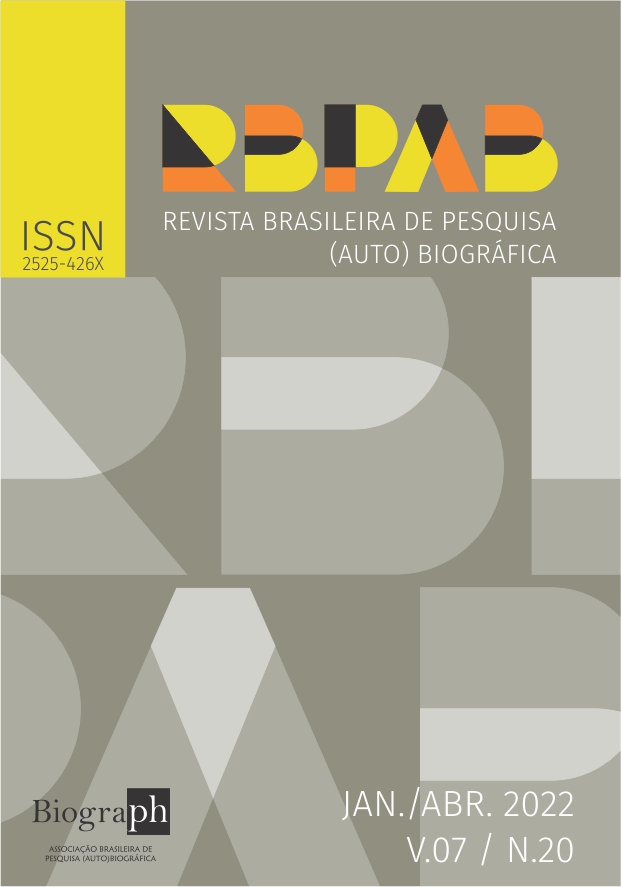Ressignificando memórias: quando a (auto)biografia anuncia a luta pela vida
DOI:
https://doi.org/10.31892/rbpab2525-426X.22.v7.n20.p38-51Keywords:
Histórias de vida, Memória, LiberdadeAbstract
What can be learnt and experienced from the resignification of memories by those who had their lives directly and indirectly affected by the prison system? This is the question that drives this article whose objective is: to discuss about the (auto)biography, experiences lived from the resignification of memories by those who have their life directly and indirectly affected by the prison system, a place in which one of my brothers passed through and died at the end of the 1990s. In this context, we consider that the short trajectory of someone (my brother) is merged with my memories and, in this way, the I and the We are merged in my (auto)biography. In order to make the investigation viable and in order to answer the proposed question, we will make use of bibliographic sources, for example, on Foucault (2004; 2014); Davis (2020); Bauman (2021) and Passeggi, Abrahão and Delory-Momberger (2012) discussing and elaborating our interpretive analyzes about the narratives of the Self and the We. The results indicate that experiences can be multiple and formative, both individually and collectively since life stories can be continually reinterpreted.
Downloads
References
BENJAMIN, Walter. Magia e técnica, arte e política: ensaios sobre a literatura e história da cultura. Obras escolhidas vol. 1. Editora Brasiliense, 1987a.
BENJAMIN, Walter. Rua de mão única. Obras escolhidas vol. 2. São Paulo: Editora Brasiliense, 1987b.
BHABHA, Homi K. O local da cultura. Belo Horizonte: Editora UFMG, 1998.
BRASIL. Ministério da Justiça. Levantamento Nacional de Informações Penitenciárias. Brasília, DF: Ministério da Justiça, 2021. Disponível em: https://www.gov.br/depen/pt-br/servicos/sisdepen. Acesso em 24 jan. 2022.
DAVIS, Angela. Estarão as prisões obsoletas? 7.ed. Rio de Janeiro: Difel, 2020.
FOUCAULT, Michel. Vigiar e punir: nascimento da prisão. 42. ed. Petrópolis, RJ: Vozes, 2014.
FOUCAULT, Michel. Ética, sexualidade e política. Rio de Janeiro: Forense Universitária, 2004.
FREIRE, Paulo. Pedagogia da autonomia: saberes necessários à prática educativa. São Paulo: Paz e Terra, 1996.
HAN, Byung-Chul. Sociedade do cansaço. [Tradução] Enio Paulo Giachini. 2. ed. ampl. Petrópolis, Rio de Janeiro: Vozes, 2017.
HUGO. Victor. Os miseráveis: texto integral. [Tradução] Regina Célia de Oliveira. São Paulo: Martin Claret, 2014.
JORGE, Seu. YUKA, Marcelo. CAPELLETTE, Wilson. A Carne. 1998. [Intérprete]: Elza Soares. Disponível em: https://www.letras.mus.br/elza-soares/281242/. Acesso em: 10 fev. 2022.
LEZAMA LIMA, José. A expressão americana. São Paulo: Brasiliense, 1988.
PASSEGGI, Maria da Conceição; ABRAHÃO, Maria Helena Menna Barreto; DELORY- MOMBERGER, Christine. Reabrir o passado, inventar o devir: a inenarrável condição biográfica do ser. IN: PASSEGGI, Maria da Conceição, ABRAHÃO, Maria Helena Menna Barreto. Dimensões epistemológicas e metodológicas da pesquisa (auto)biográfica. Natal: EDUFRN; Porto Alegre: EDIPUCRS; Salvador: EDUNEB,
2012. (Tomo II).
PERES, Lúcia Maria Vaz. A escrita da memória autobiográfica… pra que te quero? IN: SOUZA, Elizeu Clementino de, GALLEGO, Rita de Cássia (orgs.). Espaços tempos e gerações: perspectivas (auto)biográficas. São Paulo: Cultura Acadêmica, 2010.
SERRES, Michel. O terceiro instruído. Tradução: Serafim Ferreira. Portugal: Instituto Piaget, 1993.
STEPHANOU, Maria. Labirintos de existências narradas: memórias familiares escritas em álbuns de bebê. IN: SOUZA, Elizeu Clementino de, GALLEGO, Rita de Cássia (orgs.). Espaços tempos e gerações: perspectivas (auto)biográficas. São Paulo: Cultura Acadêmica, 2010.













































